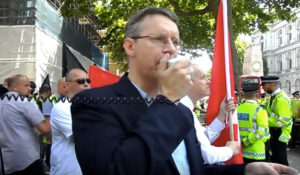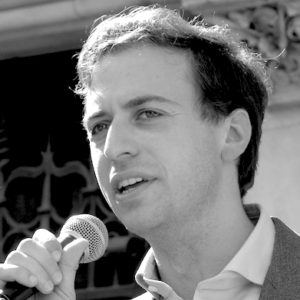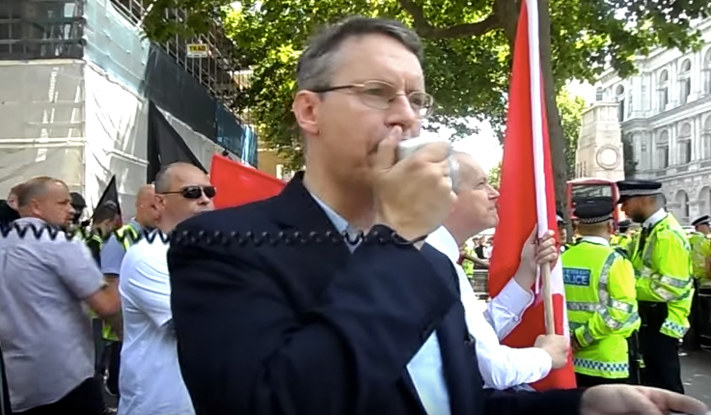Jewish Efforts to Restrict Free Speech in the UK, 1945 to the Present

Jez Turner addressing a rally
First posted on March 12, 2017.
“The judiciary itself, which has for so long been the last safeguard of our liberty and honor, seems to have forgotten the difference between ‘just’ and ‘unjust’ in the general collapse of public morality and equity.”
Alphonse Toussenel, The Jews: Kings of the Epoch, 1847.
When I was younger, and first learning to play chess, the part of the game I found most difficult was learning to interpret the intentions of my opponent and anticipate his course of action. Like most novices, my focus was on moving pawns out of the way in order to bring more powerful pieces into play. It was only as time progressed that I realized the importance and inherent power of the pawns themselves, and with that realization came an appreciation for my opponent’s opening strategy.
I was very recently reminded of this learning curve by the slowly unveiling strategy of one of Britain’s Jewish ‘charities,’ the Campaign Against Anti-Semitism (CAA), which has placed free speech in check and threatens mate at any moment. In a case that will have devastating repercussions for free speech in Britain, CAA has proven itself even more influential than the government’s Crown Prosecution Service, which has now capitulated to the Jewish group and granted a judicial review into its earlier decision not to prosecute Jeremy Bedford-Turner, known among colleagues as Jez Turner, for a 2015 speech.
The Historical and Political Context
Context is crucial, and it is important to note that the Turner case is the culmination of a strategy that long precedes even the Campaign Against Anti-Semitism. This strategy, which in Britain can be traced back to the 1910s, concerns repeated and consistent attempts to bring about the criminalization of ‘anti-Semitism,’ or in other words, to make criticism of Jews illegal. Although the precise nature of these attempts have fluctuated slightly over time, Jews have been remarkably prominent in the introduction of laws, or influencing the interpretation of laws, that negatively impact on free speech. Following the bombing of the King David Hotel in 1946, Jewish delegates attempted to pass a resolution “outlawing anti-Semitism” at that year’s annual Labour Party Conference. [1] However, the bombing immediately cost the Zionists a great many non-Jewish friends within the Labour movement, and the proposal was emphatically crushed. Following the notorious Sergeant’s Affair, in which Jewish terrorists murdered British soldiers in barbaric fashion, another explicit proposal to outlaw anti-Semitism was introduced in the House of Commons, but was rejected at its first reading in 1948. Direct and explicit efforts such as these continued to fail. In Race Politics in Britain and France: Ideas and Policy Making Since the 1960s, Erik Bleich notes that “during the late 1950s and early 1960s Jewish groups sought laws against anti-Semitic public speeches made during this era, but there is little evidence that this pressure achieved substantial results.”[2]
Further attempts to achieve such legislation were attempted through stealth, in that they concerned race more generally rather than Jews explicitly. These measures were also introduced, though unsuccessfully, with the assistance of willing White M.P.s with a track record of assisting Jews. Bleich notes that “a small number of individual Labour Party Members of Parliament repeatedly proposed antidiscrimination laws. In the early 1950s, Reginald Sorensen and Fenner Brockway each introduced ‘color bar bills’ designed to prevent discrimination against blacks on British soil.”[3] Brockway attempted no less than nine times over nine years to achieve laws against ‘discrimination’ and free speech. Although the full extent of the involvement of these politicians with Jews is unknown, a record of Parliamentary debates shows that Sorensen had been involved in assisting Jews since at least the 1930s, even participating in a 1945 symposium titled “The Future of the Jews,” where he gave a lecture to his mostly Jewish audience on “Our Common Humanity.” We have evidence that around the same time, Brockway was breaking the law by assisting Jews with forged passports and documents enabling them to enter Palestine.[4]
Since 1945, the Board of Deputies of British Jews had also been working on drafting a “group libel law” that it eventually hoped to get passed in Parliament.[5] Efforts to further tighten libel laws were made in 1952 when Jewish M.P. Harold Lever, introduced a Private Members’ Bill modifying Britain’s libel laws for the first time in over fifty years. However, Lever’s efforts were later mauled by a hostile Parliament to such an extent that by the time his Bill became an Act of Parliament, his provisions were not extended, as he and his co-ethnics had hoped, to cover groups.[6] Britain’s first legislation containing any such provision as prohibiting ‘group libel’ was introduced in Parliament by Frank Soskice, the son of David Soskice — a Russian-Jewish revolutionary exile. Scholars Mark Donnelly and Ray Honeyford state that it was Soskice who “drew up the legislation” and “piloted the first Race Relations Act, 1965, through Parliament.”[7] The Act “aimed to outlaw racial discrimination in public places,” though it was soon felt, in Jewish circles, that it hadn’t gone far enough. Crucially, the 1965 Act created the Jewish-led ‘Race Relations Board’ and equipped it with the power to sponsor research for the purposes of monitoring race relations in Britain and, if necessary, extending legislation on the basis of the ‘findings’ of such research.
In 1985, another Jew moved to criminalize expressions of White racial solidarity when M.P. Harry Cohen introduced a “Racial Harassment Bill” to Parliament. Scholar Rob Witte reports that Cohen’s attempt only failed because of “lack of parliamentary time.”[8] The following year, Cohen made a second attempt, which failed, only for Jews to return to more stealthy methods when racial elements were included with the much broader Public Order Act (1986). The Public Order Act had been introduced to Parliament by Leon Brittanisky (renamed Leon Brittan) and supported primarily by Malcolm Rifkind, a descendant of Lithuanian Jewish immigrants. It was another clever piece of work. Brittan’s team had been tasked with drafting a White Paper on Public Order to deal with a series of miners’ strikes and demonstrations. Although issues of race were not remotely related to the events provoking the White Paper, Brittan saw that the government was eager to pass legislation restricting the miners as soon as possible and, sensing that the wide-ranging bill would endure little opposition, he ensured that additional elements were included, such as the criminalization of “incitement to racial hatred.”[9] It is Brittan’s clever little addition which has posed problems for more vocal racial nationalists in Britain today, and which is being used in part in the CAAs war on Jez Turner.
The Turner Case
On July 4th 2015 Jez Turner, along with fellow patriots, staged a static protest in Whitehall, opposite Downing Street, in protest at the development of the Shomrim, a Jewish ‘defense’ group that possessed all the trappings of an illegal religious police force. During the protest, it has been alleged that Turner gave a speech in which he stated that that “all politicians are nothing but a bunch of puppets dancing to a Jewish tune, and the ruling regimes in the West for the last one hundred years have danced to the same tune.” Turner is also reported as having stated that Jews played an influential role in the French Revolution and both World Wars, before concluding that England was a content and successful nation during the period of the expulsion (1290–1656), and adding that we should “free England from Jewish control.”

Gideon Falter: Head of the Campaign Against Anti-Semitism
Although the initial report to the police was made by the more senior Jewish organization, the Community Security Trust (CST), Gideon Falter, head of the Campaign Against Anti-Semitism,[10] was the most vocal and ardent pursuer of the case. The police, in accordance with established process for ‘hate crimes,’ passed footage of the speech to the Crown Prosecution Service’s counterterrorism division. It was here that Falter began to encounter difficulties, and why a further Jewish campaign to hinder free speech in Britain has acquired momentum in the last twelve months. While Leon Brittan’s inclusion of an ‘incitement to racial hatred’ clause in the 1986 Public Order Act was an important hit on free speech, it was not all-encompassing, and it did not come close to making ‘anti-Semitism’ illegal. The Crown Prosecution Service’s policy guidelines on cases involving ‘incitement’ under the 1986 Act clearly state that the language employed by a defendant must have been “threatening, abusive or insulting. These words are given their normal meaning but the courts have ruled that behavior can be annoying, rude or even offensive without necessarily being insulting.”
Moreover, further comment from the CPS has made it clear that the language employed by the defendant must have been “grossly abusive or insulting” or moved beyond reasonable “criticism” of a group, for a prosecution to be valid, since “it is essential in a free, democratic and tolerant society that people are able robustly to exchange views, even when these may cause offence.” At some point in the aftermath of Falter’s report to the authorities, the CPS made the decision that Jez Turner hadn’t said anything illegal and ceased legal action against him.
Five months after the speech, Gideon Falter approached the Chief Crown Prosecutor for London with a view to discovering the charging decision in the case. He was informed by the CPS that Turner was entitled to free speech and hadn’t broken any laws. Falter then attempted to request a Victim’s Right to Review, a request that was declined on the basis that Turner hadn’t mentioned Falter and therefore Falter couldn’t claim victim status. Falter then used his influence to obtain meetings with both the Chief Executive of the CPS and the Director of Public Prosecutions, both of whom informed Falter that Turner simply hadn’t broken the law. At that point Falter, who has previously boasted of “holding the government’s feet to the fire,” issued legal proceedings against the CPS in his effort to make ‘anti-Semitism’ illegal, with or without legislation.
It is with all of this in mind that we need to reconsider some other recent developments, because other pawns have been put in place just prior to the latest twist in the Turner case — the ‘test case’ for the criminalization of criticism of Jewish influence in Britain. These pawns have consisted of two major propaganda drives, both of which have been largely led or orchestrated by Falter. The first drive has been a constant media droning about a putative, but somehow mysteriously invisible, “rise in anti-Semitism” in Britain. Falter has been the chief author of this myth, writing in January 2015 of “Britain’s tsunami of anti-Semitism.” Falter’s ‘tsunami’ apparently consisted of a polling result in which 25% of British respondents replied positively to the statement: “Jews chase money more than other British people.” Falter, who evidences almost psychopathic levels of paranoia, claimed that even though this much-feared anti-Semitism was ‘invisible,’ “the Jewish population must be protected by the state. … British people must remind their Jewish countrymen that they stand with us. Anti-Semitism in Britain is not a Jewish problem, it’s a British problem.” In a masterfully Jewish false syllogism, Falter added that: “Jews are the litmus test of freedom – our fate is the fate of society.”
It is an unfortunate fact that the media and government have indulged the wanton paranoia of this individual and the group of fanatics that he leads. Falter has not only been given meetings with those at the highest levels of government and law enforcement, but has even been allowed to put forward proposals that Jews be allowed to ‘educate’ police and prosecution lawyers on who, and for what comments, they should charge. We may consider it a paradox indeed, for an allegedly poor, downtrodden, and persecuted group to “hold the feet of the government to the fire.”
It was on the back of this ‘fake news’ of a rise in anti-Semitism that Falter produced another masterstroke in pushing the British government to adopt a ludicrously vague ‘official definition’ of anti-Semitism:
Anti-Semitism is a certain perception of Jews, which may be expressed as hatred toward Jews. Rhetorical and physical manifestations of antisemitism are directed toward Jewish or non-Jewish individuals and/or their property, toward Jewish community institutions and religious facilities.
The significance of the adoption of this nonsensical statement had less to do with the definition itself, than it had to its part in the larger effort to criminalize criticism of Jews. The adoption of the definition, in tandem with Jewish-orchestrated media propaganda about a non-existent rise in anti-Semitism, has been part of an attempt to weaken interpretations of the 1986 Public Order Act that lean towards protecting free speech. Falter has complained that “our criminal justice system is failing badly,” by which he means that the criminal justice system is not fully serving Jewish interests. The new ‘pawns’ pushed forward by Falter and his ilk are intended to convince the public, government, and the legal system that Jews, and not free speech, should be protected, and that they should be protected from criticism — because, after all, criticism is based on “a certain perception of Jews,” and is therefore anti-Semitic. The implication of this phrasing, of course, is that actual data on Jewish influence on the media or the political process (including enacting laws against free speech!) are removed from honest public discussion and debate.
With the media-invented frenzy about the ‘rise’ in anti-Semitism, and the introduction of a new definition of anti-Semitism, all that was needed for a final assault on the deficiencies of the 1986 Public Order Act was a test case in which a defendant had previously escaped prosecution under it. Jez Turner was just such a defendant, and he has been selected by Jewish activists as the fulcrum on which the fate of free speech in Britain will turn. Just days ago, in an unprecedented eventuality, the CAAs legal team forced the CPS to reconsider its decision not to prosecute Turner. Falter gloated immediately that “their surrender was unequivocal.”
The question remains for all freedom-loving Britons and for all men of the West where this warning sounds: Will you surrender? One person who won’t is Jez Turner himself. I met Jez in person a little over a year ago in Stockport, England, and found him to be an intelligent and affable gentleman. He is not given to extremes, and is often considered in his choice of words and actions. We discussed history and politics over fish and chips, and literature during one (very windy) walk along the coast. A very talented speaker and organizer, Jez has given a lot to the cause in England, and has done so during periods where others have taken a back seat. In particular, his London Forum has been the lifeblood of the movement in Britain during the last several years. All of this, of course, makes him a valuable ‘scalp’ to our opponents, and the ideal target upon which to base the broader assault on free speech.
Despite the fact that a courtroom beckons, Jez remains in good spirits. In my last correspondence with him he had this to say — clearly anticipating a courtroom battle over the extent of Jewish influence in Britain. I can think of no better way to finish:
“Our job is to get the truth out there in whatever way possible and a court room is a good a place as any.”
[1] P. Medding, Studies in Contemporary Jewry: XI: Values, Interests and Identity, 108.
[2] E. Bleich, Race Politics in Britain and France: Ideas and Policy Making Since the 1960s, 42.
[3] Ibid, 41.
[4] C. Knowles, Race, Discourse and Labourism, 172.
[5] D.S. Wyman, The World Reacts to the Holocaust, 617.
[6] C. Adler (ed), The American Jewish Year Book, 1953, 234.
[7] M. Donnelly, Sixties Britain: Culture, Society and Politics, p. 115, & R. Honeyford, The Commission for Racial Equality: British Bureaucracy Confronts the Multicultural Society p.95.
[8] R. Witte, Racist Violence and the State: A Comparative Analysis of Britain, France, and the Netherlands, p.71.
[9] T. Brain, A History of Policing in England and Wales Since 1974, p.104.
[10] The CAA is likely to be funded by George Soros but, like the CST and other Jewish charities, they do not reveal donors or committee members for ‘security reasons,’ a privilege granted only to Jewish organizations or those following their agenda. Tony Greenstein, an anti-Zionist Jew, is attempting to get the CAA de-registered as a charity.






Comments are closed.